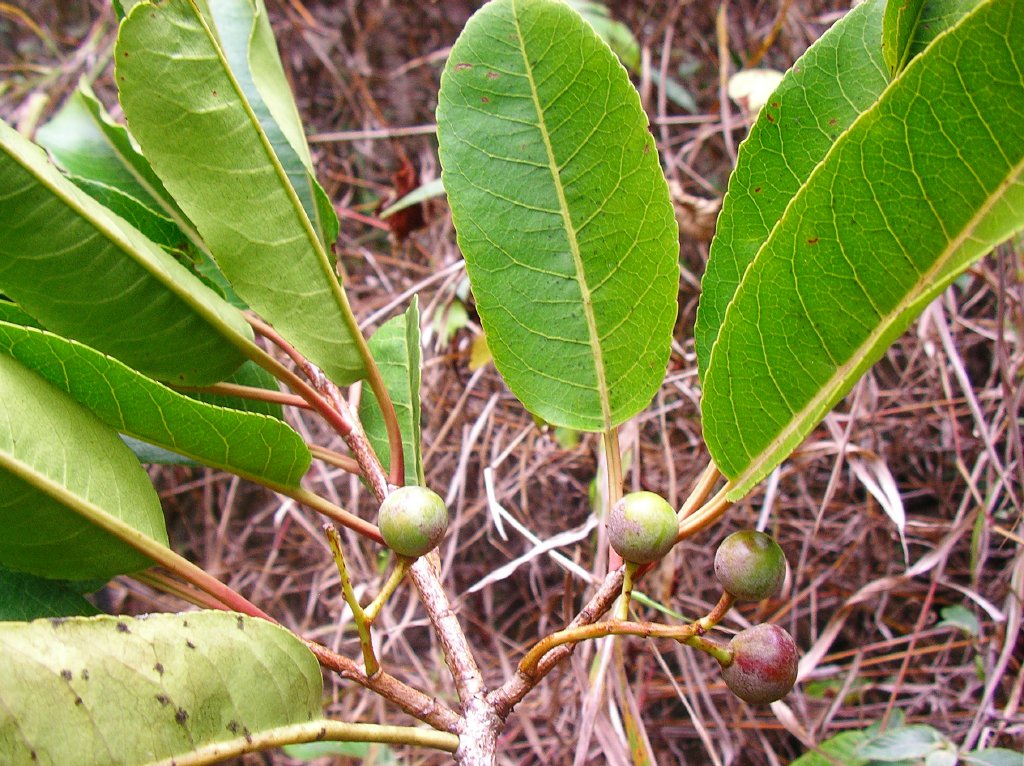Image by Judy Hung on WordPress.com
Disclosure: This article may contain affiliate links, meaning we get a commission if you decide to make a purchase or sign up through our links, at no cost to you. For further details, please refer to our disclaimer.
The serenity of a restful night and the vitality of a healthy prostate, all encapsulated within the essence of this potent herb.
With modern lives chock-full of stress, unhealthy diets, and sedentary habits, it’s not just about chasing fleeting moments of tranquility; it’s about maintaining the very essence of masculine health.
Let me tell you how Pygeum Africanum has changed the lives of many guys around the world and become an unknown hero for them.
Rooted Revelations
- Pygeum Africanum’s Dual Role: Not only has this natural wonder shown promise in improving prostate health, but it’s also a key player in enhancing sleep quality.
- Hormonal Harmony: The intricate dance between sleep, prostate, and hormones is mind-boggling. As I’ve discovered, disruptions in this balance can lead to reduced libido, relationship strains, and changes in bedtime routines.
- Blood Pressure and Prostate Health: It’s no secret that anxiety, sleep disruptions, and elevated blood pressure are interconnected. But the stealthy symptoms of cardiovascular diseases amplified by prostate issues? That’s a silent storm waiting to erupt, and being informed can make all the difference.
- Emotions and Well-being: Beyond the physical, there’s an emotional web connecting sleep disturbances, depression, and prostate health.
- A Personalized Pygeum Lifestyle: While Pygeum Africanum offers transformative effects, it’s essential to tailor it to individual needs. From ensuring quality and right dosages to regular health checks, every step counts.
Table of Contents:
- The Heart of Pygeum Africanum (Prunus africana) – More Than Meets the Eye
- Slumber and Pygeum Africanum – A Match Made in Heaven
- Prostate Health – Comfort, Control, and Clarity
- Blood Pressure’s Silent Dance with Anxiety and Prostate Health
- Hormones – The Symphony of Sleep and the Prostate
- Nutrient Balance – Pygeum Africanum’s Secret Role
- Mind Matters – Emotional, Physical, and Everything in Between
- Perfecting the Pygeum Potion – Tailored for You
- The Pygeum Lifestyle – Your Blueprint for Prostate Health and Sleep
- Frequently Asked Questions
The Heart of Pygeum Africanum (Prunus africana) – More Than Meets the Eye
Why Every Man Should be in the Know About the Prostate’s Role in Well-Being
I’ve met countless men who are oblivious to the role their prostate plays in their overall health. Picture this: it’s a tiny gland, the size of a walnut, sitting quietly below your bladder. As men, our reproductive health, urinary function, and overall vitality lean heavily on the health of this silent hero.
Little did he know sometimes that frequent nighttime urination, known scientifically as nocturia, is ringing alarm bells about bad prostate health.
Disturbingly, many dismiss these nightly bathroom visits as mere results of aging or overhydration.
Yet, nocturia might be a signal that your prostate is undergoing changes, and not necessarily for the better.
Pygeum Africanum’s Shining Moment for Both Dreamy Nights and a Healthy Prostate
During those quiet hours when you’re wrapped up in dreams, your prostate doesn’t clock out. It’s actively producing and releasing prostatic fluid into your urethra, especially during arousal.
Now, imagine this process getting hindered by inflammation or enlargement of the prostate. The results? Discomfort, interrupted sleep, or even urinary infections.
The interplay of prostate functions after sunset can be a silent contributor to your nighttime restlessness.
Have you ever experienced tossing and turning all night, then waking up feeling like you’ve barely slept?
The connection between your sleep cycle and prostate health is more intimate than you might think.
Interrupted sleep due to frequent urination can halt your entry into deep, restorative sleep stages.
As a result, you miss out on the healing and rejuvenation that these stages offer.
Enter Pygeum Africanum, a miraculous bark extract from the African cherry tree.
Historically, indigenous tribes in Africa have sworn by its therapeutic properties, and modern science agrees.
Pygeum Africanum has demonstrated promising results:
- In reducing prostate inflammation
- And, consequently, nocturia.
For those seeking a twofold benefit of peaceful nights and prostate health, this natural remedy stands tall.
Slumber and Pygeum Africanum – A Match Made in Heaven
The Delicate Balance Between Sleep, Hormones, and Wellness
I’ve seen countless men struggle with sleep disturbances, and more often than not, there’s an underlying shadow of anxiety or depression.
But here’s where Pygeum Africanum steps into the limelight.
There’s a symphony happening in our bodies every night – a balance of hormones, sleep cycles, and overall wellness. When one instrument plays off-key, the entire concert can feel jarring.
Disrupted sleep can set off a chain reaction, impacting our hormonal balance. Pygeum Africanum has shown to play a pivotal role in reharmonizing this delicate balance, ensuring we wake up refreshed and hormonally balanced.
Natural Pygeum Africanum’s Edge Over Prescription Drugs for Sleep and Prostate Health
Now, I’ve been through stacks of research, and one thing stands clear: Pygeum Africanum packs a punch, especially when compared to some prescription drugs.
Though Pygeum Africanum has side effects it is minor compared to some prescription drugs that can increase the risk of aggressive prostate cancer, cause erectile dysfunction, loss of libido, or testicular pain to name a few.
While many sleep medications come with an array of side effects, Pygeum Africanum offers a natural solution with minimal concerns.
You should still consult your doctor before using any herbal supplements or medications and ask about the benefits and risks of each option.
Prostate Health – Comfort, Control, and Clarity
Prostate Health’s Lesser-Known Sides: Infections and Inflammations
I’ve always been amazed by how interconnected the human body is. Case in point: your prostate health can actually influence the quality of your sleep.
There’s a fascinating dynamic here; men with prostate issues often report disruptions in their sleep. But what many don’t realize is that these disruptions can be a result of prostate conditions causing frequent nighttime urination.
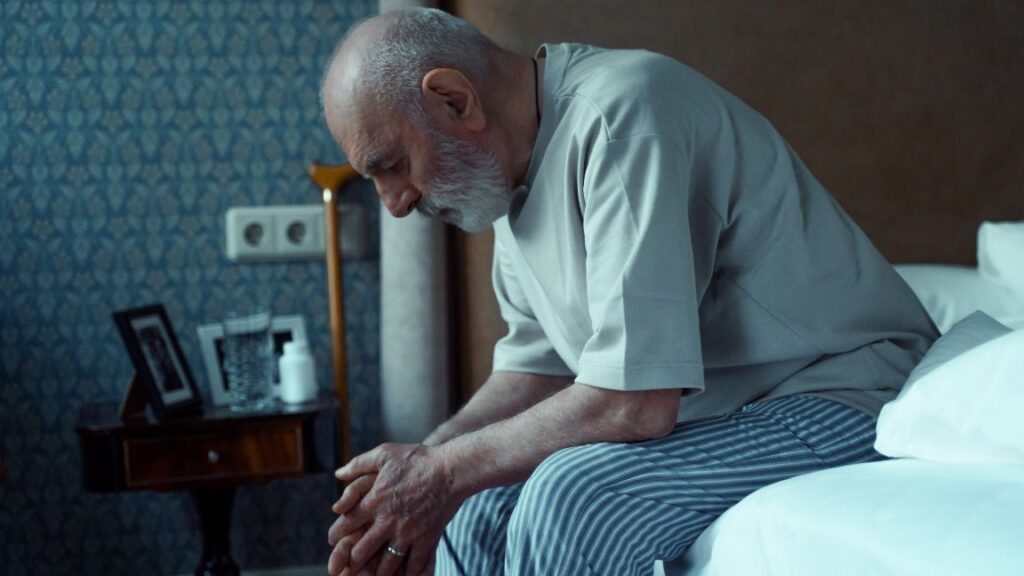
As a result, their sleep cycle gets fragmented, leading to an overall drop in sleep quality.
When people hear “prostate problems,” they often think of benign enlargement or, more seriously, prostate cancer.
However, there are other prostate conditions, such as:
- Prostatitis, which involve inflammation or infection of the prostate gland
- And symptoms can range from pelvic pain, difficulty urinating, and yes, even sleep disturbances
An inflamed prostate can not only be painful but also, much like an enlarged prostate, lead to those dreaded nighttime bathroom trips.
A study showed that prunus africana has anti-inflammatory properties that reduces pain in the prostate and helps to stop the spread of cancer cells.
It’s not just the physical discomfort of a prostate issue that can steal your sleep. Think about it: worries about one’s health, the anxiety of frequent bathroom trips, or the stress of a possible medical procedure can lead to insomnia or restless sleep.
Tips and Tricks when Prostate Issues Steal your Sleep and your Overall Vitality
So, what can you do if prostate problems are causing sleep disturbances? First, I always recommend seeing a specialist to address the root cause.
But for immediate relief, consider adjusting your liquid intake in the evening, ensuring you empty your bladder before bed, and perhaps elevating your legs can help.
Additionally, relaxation exercises or even meditation can help ease the anxiety or stress associated with prostate health.
Your prostate’s state can often mirror other health conditions or imbalances in your body.
By taking care of your prostate – through regular check-ups, a balanced diet, and paying attention to its signals – you’re not just ensuring its health but also taking a step towards better overall vitality and well-being.
Pygeum Africanum Supplement For BPH & Prostate Relief
For those seeking the benefits of Pygeum Africanum for BPH and other prostate issues, ProstaMend is the top natural supplement choice.
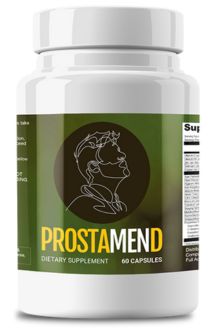
ProstaMend is an all-natural prostate support supplement. It contains a powerful blend of 32 carefully selected plant extracts such as Saw Palmetto, Cat’s Claw, Pygeum Africaum, and the Japanese Mushroom Trio (Reishi, Shitake, & Maitake) extract which work together to maintain healthy prostate health and urinary function. Formulated and produced in an FDA-approved facility, ProstaMend is non-GMO and diabetic-friendly. Just take two easy-to-swallow capsules daily to relieve BPH symptoms and support overall prostate wellness. Buy ProstaMend Now Or Watch Their Video Presentation Here To Learn More.
Blood Pressure’s Silent Dance with Anxiety and Prostate Health
Hidden Threats of Cardiovascular Diseases and their Stealthy Symptoms
Men tossing and turning in their beds, kept awake by a blend of racing thoughts and the pressing need to use the bathroom, yet again.
The stress from such repeated disturbances can indeed take a toll. Elevated blood pressure often lurks in the shadows, waiting to strike those vulnerable.
Anxiety, particularly due to sleep disturbances often seen with prostate problems, directly affects our heart’s rhythm. Consistent lack of sleep, as many studies suggest, can lead to an increase in blood pressure levels.
Cardiovascular diseases are the silent predators of the modern world. Often, they creep up on a person without any significant signs.
For many, the first indication might be a heart attack or stroke. And here’s a little nugget of truth for you: the silent nights disrupted by prostate issues and the resulting anxiety can indirectly contribute to this lurking menace.
For instance, imagine the body’s stress response being activated every night, every time you’re jolted awake. This consistent stress can lead to inflammation, a significant player in cardiovascular diseases.
Environmental Factors that can be a Menace to Sleep and Prostate Vitality
Our surroundings play a pivotal role in our health – something that’s often underestimated. The lighting in our bedrooms, the quality of the air we breathe, even the sounds in our environment can have pronounced effects on our sleep and, by extension, our prostate health.
Did you know that prolonged exposure to certain toxins or even excessive noise can both disrupt our sleep patterns and potentially impact our prostate?

It’s crucial to understand our environment and make necessary changes, ensuring we give our body the optimal conditions it needs.
But here’s a fact: the long-term impact of disrupted sleep goes beyond groggy mornings. Persistent interruptions can lead to mood imbalances, memory problems, and yes, further health complications related to the heart and blood pressure.
The simple act of getting up multiple times at night to relieve oneself can rob the body of deep REM sleep, vital for cognitive functions and emotional balance.
Over time, this loss accumulates, and the true cost? It’s more than just a few sleepless nights; it’s an overall decline in quality of life.
Hormones – The Symphony of Sleep and the Prostate
The Link Between a Reduced Libido in Men and Sleep
I’ve observed many times that when men come complaining of a diminished drive, they’re often overlooking a crucial factor – their sleep patterns. It’s not just about the hours but the quality.
Testosterone, that all-important male hormone, has its production cycle during the deep sleep phases. So, if a man isn’t reaching or maintaining this deep sleep, his testosterone levels might not peak as they should.
Aging is a beautiful journey… but it comes with its own set of challenges.
One that stands out for men is the connection between prostate health, sleep, and hormones.
As men age, the prostate can enlarge, leading to frequent nighttime trips to the bathroom. This, of course, disrupts the quality of sleep. And when sleep quality diminishes, hormonal balances can get thrown off-kilter.
A study confirmed that people with LUTS/BPH who get up to urinate at night have trouble sleeping, and their sleep quality worsens as they urinate more frequently. This indicates that nocturia interferes with their sleep.
It’s a cycle – one affects the other. It’s essential to be aware and proactive, making lifestyle changes or seeking medical advice when necessary.
Aging Beautifully with Insights on Sleep, the Prostate, and Those Golden Years
Let me share a hypothetical tale. Imagine Mark, who’s been married for 20 years. He’s begun experiencing prostate problems – leading to sleep disturbances.
This isn’t just affecting Mark; it’s affecting his relationship. His partner notices his fatigue, the mood swings, and the reduced intimacy. It’s not just about Mark’s physical health but also about the health of his relationship.
Both partners can feel the strain. It’s a narrative I’ve heard echoed in many consultations.
It’s essential to communicate and seek solutions together, be it a lifestyle change or medical intervention.
Coffee, Tea, and Other Bedtime Beverages
Drinks like coffee and tea are diuretics.
What does this mean?
They make you pee more! For someone already making frequent trips to the bathroom due to prostate issues, this can aggravate the situation.
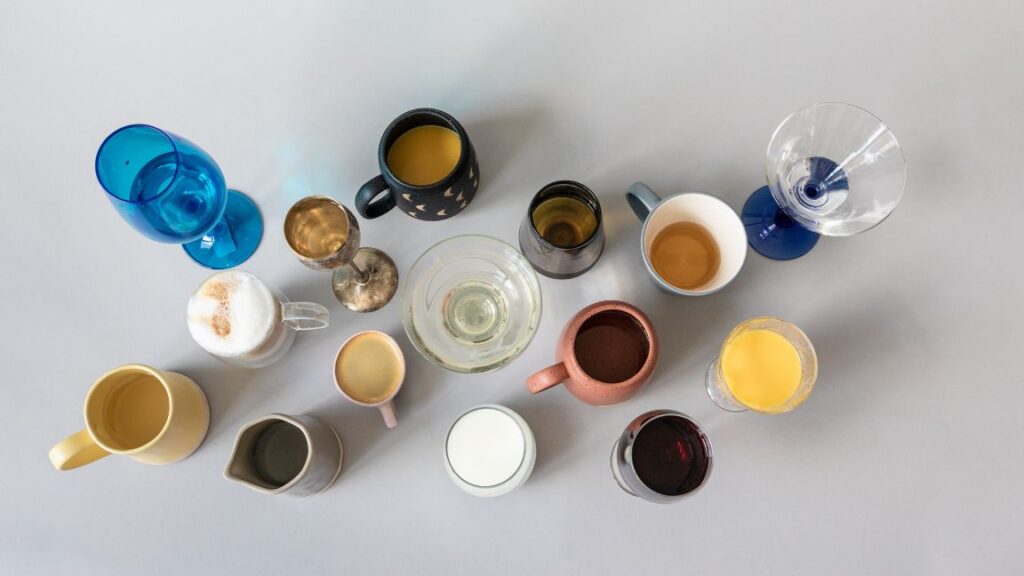
My advice? If you’re facing prostate problems, rethink that evening cup. Opt for caffeine-free herbal teas or simply a warm glass of milk.
Your sleep and your prostate will thank you.
Nutrient Balance – Pygeum Africanum’s Secret Role
Pygeum Africanum Taking Center Stage in the Nutrient World
When I first came across Pygeum Africanum, I was attracted by its amazing features, which appeared to epitomize the glories of the natural world.
Both the prostate and our ability to get a good night’s sleep may be badly affected by our increasingly sedentary lifestyles, which are often accompanied by overeating. As a result, our body’s natural 24-hour physiological cycle is thrown off.
Pygeum Africanum Potential for Reducing Food Inequalities
One can wonder whether there is a connection between a certain fitness routine and improved sleep and prostate health.
The answer is yes, that much is certain.
Walking, swimming, and gentle yoga are all examples of modest physical activities that might have a major effect.

Incorporating these practices into your daily life, in addition to eating a healthy diet supplemented with Pygeum Africanum, may lead to even more impressive results.
Additional medical benefits of this potent berry are its potential to lower cholesterol and its ability to regulate insulin activity, thus managing blood sugar levels.
Mind Matters – Emotional, Physical, and Everything in Between
Cardiovascular Health Shadowed by Depression’s Gloom
Over the years, there have been numerous theories… about how sleep affects prostate health and vice versa.
Some say that disrupted sleep worsens prostate issues, while others argue the opposite.
What’s factual?
Studies have shown that while poor sleep can exacerbate prostate problems, prostate issues can also interrupt sound sleep.
A large study in Taiwan involving over 80,000 men revealed that sleep disorders may increase the likelihood of getting prostate cancer.
So, when your buddy claims that his prostate issues are “just because he’s not sleeping well,” take it with a pinch of salt and guide him to see a specialist.
Stress is a modern-day plague that few escape, and its ramifications on sleep are evident. But how does it influence the prostate?
Chronic stress leads to hormonal changes that, over time, can affect the prostate’s health. While it’s not a direct cause, it’s a significant factor that shouldn’t be overlooked.
After all, a peaceful mind often leads to a rested body.
Perfecting the Pygeum Potion – Tailored for You
Pygeum Africanum’s Transformative Effects on Sleep and the Prostate
There was a time when I first stumbled upon Pygeum Africanum and was astounded by its potential benefits.
From its roots in Africa to health stores worldwide… this herbal marvel has been revered for its potential to enhance sleep and prostate health.
Let’s break it down: When a person’s sleep cycle gets disrupted, often due to issues like an enlarged prostate leading to frequent nighttime urination, it’s not just the hours of rest that take a hit. Your mood, energy, and even your heart can bear the brunt.
Its bark, when processed and ingested, has shown promising results… in reducing those annoying nocturnal bathroom trips, gifting many with the boon of uninterrupted sleep.
Zeroing in on Pygeum Africanum’s Quality, Dosages, and Side Effects
Not all Pygeum Africanum supplements are made equal. It’s pivotal to select one that boasts of high quality and authenticity.
Overview of The Benefits & Dosage of Supplement:
| Group | Benefits | Dosage | Side Effects |
|---|---|---|---|
| Children | N/A | N/A | Not recommended |
| Pregnant or Breastfeeding Women | N/A | N/A | Not recommended |
| Men with Prostate Issues | – Reducing prostate enlargement (benign prostatic hyperplasia or BPH) – Decreasing urinary flow rate – Reducing nocturia (nighttime urination) | – 50 mg twice daily or – 100 mg once daily | Pygeum Africanum is generally considered safe when used correctly. However, some people may experience side effects such as: – Nausea – Upset Stomach – Abdominal pain – Diarrhea – Constipation If side effects occur, decrease dosage or discontinue use. |
Note: It’s advisable to consult with a medical professional before incorporating Pygeum Africanum into your diet to ensure you’re getting the most beneficial dosage that’s tailored to your body’s needs.
From my research, the right dosage varies, typically ranging from 50mg to 200mg daily. But, it’s always essential to start slow. Begin with a minimal dose and monitor your body’s response.
Some users have reported mild side effects like stomach upset, but it’s generally well-tolerated.
Here’s a bit of advice I often share: Just because something is natural doesn’t mean it can be taken lightly.
If you’re considering combining Pygeum Africanum with other treatments or medications, it’s absolutely paramount to have a sit-down with your doctor or a health expert. They can provide tailored guidance, ensuring you get the maximum benefits without any undue risks.
Your Body is Unique
what works wonders for one might need adjustments for another.
Embrace the Pygeum Africanum prostate benefits but always with a dash of caution and consultation.
The Pygeum Lifestyle – Your Blueprint for Prostate Health and Sleep
Strategies for Facing Both Sleep and Prostate Challenges Head-on
You might find it surprising, but many of the same habits that promote good sleep can also keep your prostate in check.
I’ve spent years studying this overlap and found that maintaining:
- A balanced diet, rich in fruits, vegetables, and lean proteins
- And combined with regular exercise can do wonders.
Men often overlook the importance of hydration. Drinking plenty of water throughout the day ensures a well-functioning prostate and helps with sleep cycles too.
A 58-year-old from Ohio, had been battling with prostate issues for a while. Frequent night-time visits to the bathroom disrupted his sleep.
But when he incorporated Pygeum Africanum into his routine, he noticed a significant reduction in nocturnal trips. His sleep improved drastically, and his energy levels soared.
Similarly, Kumar, a gentleman from India, told me how introducing certain lifestyle changes, along with the herb, made him feel decades younger!
The Japanese practice of “Shinrin-Yoku” or “forest bathing” emphasizes the rejuvenating properties of nature, not just for the mind, but for the body.
Taking walks in nature and embracing serene environments have been linked to improved sleep quality and reduced stress… which indirectly benefits prostate health.

In the Mediterranean, diets rich in olive oil, nuts, and fish have shown to promote sleep and benefit prostate function.
Words of Hope and Compassion for Those on a Sleep and Prostate Health Journey
I cannot stress this enough – regular check-ups are your first line of defense. By monitoring your prostate health and sleep patterns, early anomalies can be detected and addressed.
A simple PSA (Prostate-Specific Antigen) test, along with discussions about your sleep quality with a healthcare professional, can provide insights and strategies tailored specifically for you.
Facing sleep and prostate challenges isn’t easy, but remember, you’re not alone – I’ve interacted with countless men who’ve walked this path and emerged stronger.
Embrace the tools and knowledge available today, and always lean on your community for support.
And if you ever feel lost, just remember: every journey starts with a single step, and there are numerous footsteps before you leading the way:
- You have the strength
- The resilience
- And the power to reclaim your nights and your health.

Embarking on a journey through the nuanced layers of sleep, prostate health, and the incredible contributions of Pygeum Africanum has been nothing short of enlightening.
As we’ve unraveled, sleep is not just about resting our eyes; it’s intertwined with our emotional well-being, cardiovascular health, and the silent but influential prostate.
The age-old wisdom from the east, the magic of nutrients, and modern-day tech tools have showcased how multifaceted this journey truly is.
If there’s one recommendation I’d make, based on the mountain of evidence and personal stories, it would be the incorporation of Pygeum Africanum into your lifestyle.
But like any decision about your health, it’s essential to consult with a healthcare professional. It might just be the supplement that bridges the gap between restless nights and a reinvigorated zest for life.
Here’s to sleep-filled nights and a future brimming with vitality.
Frequently Asked Questions
Why should I even care about Pygeum Africanum’s role in prostate health?
Honestly, I felt the same way initially, but then I realized the prostate’s role in well-being is more significant than many realize. Pygeum Africanum plays a pivotal role in supporting prostate health, which directly influences nighttime urination and sleep quality. It’s something every man should be aware of for a comfortable life.
Is Pygeum Africanum really better than prescription drugs for sleep?
Oh, that’s a tough one. From personal experience and all the studies I’ve delved into, Pygeum Africanum showcases prowess in promoting sleep naturally, giving it an edge over many prescription drugs. But here’s the twist: always consult with a healthcare professional before making changes to your medication.
I’m struggling with sleep disturbances from prostate issues. Is there any hope?
I completely empathize with you on this. Prostate health and sleep disturbances can be a challenging dance. Thankfully, Pygeum Africanum has transformative effects on both sleep and prostate health, offering hope for many. And trust me, strategies do exist to face these challenges head-on!
How does Pygeum Africanum impact blood pressure?
Anxiety, sleep, and elevated blood pressure have an intricate connection. Pygeum Africanum seems to alleviate some of these issues, helping in the silent dance of anxiety and prostate health. The link is fascinating and offers so much promise!
Are there any side effects I should be concerned about with Pygeum Africanum?
With Pygeum Africanum, while it boasts several benefits, it’s crucial to zero in on its quality, dosages, and potential side effects. I’d recommend a health consultation when combining it with other treatments.
Is Pygeum Africanum suitable for everyone?
It’s a natural wonder in many ways. But just like every other supplement or medicine, Pygeum Africanum might not be a universal fit. It’s always best to consult with a health professional. Remember, every body is unique!
Can wearables help in the sleep-prostate journey?
This is exciting! Wearables today are advanced and play a role in tracking both sleep and prostate health. I’ve seen some fantastic success stories, but, as always… it’s essential to choose the right tool for your needs.
Ready to dive into the world of Pygeum Africanum for improved sleep and prostate health?
On a side note, do you think natural remedies overshadow conventional medicine in today’s world?
Resources:
- WebMD on Pygeum Africanum
- Mayo Clinic on Prostate Health
- Sleep Foundation on Sleep and Health
- American Heart Association on Blood Pressure and Sleep
- Harvard Health on Prostate Health and Sleep
- National Institute on Aging about Prostate Health
- Chatelain C, Autet W, Brackman F. Comparison of once and twice daily dosage forms of Pygeum africanum extract in patients with benign prostatic hyperplasia: a randomized, double-blind study, with long-term open label extension. Urology. 1999 Sep;54(3):473-8. doi: 10.1016/s0090-4295(99)00147-8. PMID: 10475357.
- Chung WS, Lin CL. Sleep disorders associated with risk of prostate cancer: a population-based cohort study. BMC Cancer. 2019 Feb 13;19(1):146. doi: 10.1186/s12885-019-5361-6. PMID: 30760242; PMCID: PMC6375129.
- Doo SW, Lee HJ, Ahn J, Kim JH, Yun JH, Yang WJ, Song YS. Strong impact of nocturia on sleep quality in patients with lower urinary tract symptoms. World J Mens Health. 2012 Aug;30(2):123-30. doi: 10.5534/wjmh.2012.30.2.123. Epub 2012 Aug 31. PMID: 23596599; PMCID: PMC3623520.
- Larré S, Camparo P, Comperat E, Boulbés D, Haddoum M, Baulande S, Soularue P, Costa P, Cussenot O. Biological effect of human serum collected before and after oral intake of Pygeum africanum on various benign prostate cell cultures. Asian J Androl. 2012 May;14(3):499-504. doi: 10.1038/aja.2011.132. Epub 2011 Dec 26. PMID: 22198631; PMCID: PMC3720175.

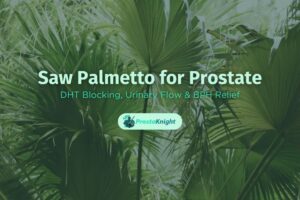
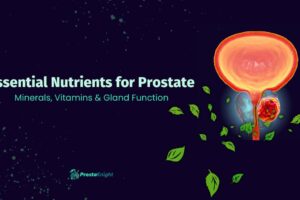
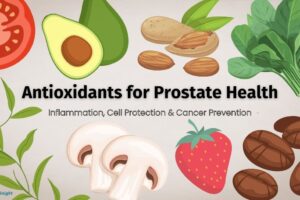
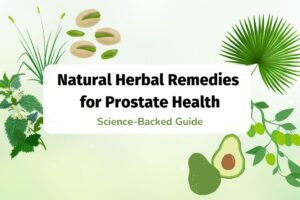
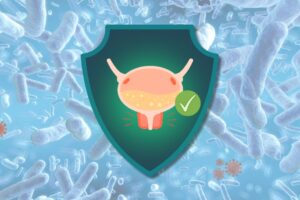
![Comprehensive Prostate Health: Essential Guide for Men [2024] Comprehensive Prostate Health Featured Image](https://prostaknight.com/wp-content/uploads/2024/09/Comprehensive-Prostate-Health-300x200.jpg)




